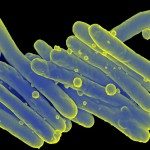Lien vers Pubmed [PMID] – 20382566
Tuberculosis (Edinb) 2010 May;90(3):182-7
Tuberculosis (TB) is a leading cause of death globally. TB had been considered conquered in Europe but has re-emerged as a significant problem, partly because of poor TB control programs and the link with HIV infection, migrants and other vulnerable populations, but also because a mood of complacency led to declining investment in research and public health infrastructure. In the European Union (EU), efforts initiated by the European Academies Science Advisory Council (EASAC) now assess how research can better inform policy development and indicate the gaps and uncertainties in the scientific evidence base. A growing number of Mycobacterium tuberculosis (Mtb) strains are now resistant to the first-line anti-TB drugs, necessitating use of second-line drugs which are more expensive, less effective and more toxic. The presence of extensively drug-resistant (XDR) TB in the EU illustrates that there are problems with TB management and control. In the EU, the aggregated rate of notified TB is approximately 18 cases per 100,000 population (range 4-120 cases/100,000 in different Member States). The highest rates are found in Eastern European countries. Only about half of EU countries routinely perform drug susceptibility testing linked to notification of TB cases. It is important for the European Commission (EC) to network regional reference laboratories to support molecular epidemiology and exchange of data via creation of interactive international databases of Mtb genotypic and phenotypic information. EU countries should help develop TB laboratory services by investing in training and provision of assistance to maintain quality control in neighbouring Eastern European countries. Improved TB care necessitates research across the spectrum to include fundamental and epidemiological science, research and development (R&D) for new drugs, diagnostics, vaccines, and operational research. Total R&D investment in TB by the EC and Member States is low by comparison with the USA despite Europe being on the frontline of the epidemic. Thus, alternative funding models for targeting TB research priorities by the EU are required. Increasing the visibility of TB as a priority issue for the EU requires the scientific community, with the academies of science, as appropriate, to communicate to politicians, healthcare providers, funders and the public at large about the current threat posed by drug-resistant TB. Any global strategy for TB control must also take into account measures to address the social, environmental and economic issues which are inextricably linked with TB. The academies conclude that, overall, the EU has failed so far to respond sufficiently to the global TB threat but can still draw on considerable strengths in its science. The EU also has a humanitarian responsibility to support TB control in developing countries. It remains very important for the EC that neither biomedical research nor investment in health services should become a casualty of the current economic recession.

